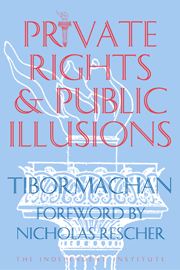In the 1840s a debate raged about whether strikers may be punished as economic saboteurs because they disrupted commerce. Some argued that the police power of government authorized prohibiting strikes on the grounds that government is to keep commerce in motion and forbid work stoppages. This, indeed, is the theory of monarchical government in which the king or queen or tsar decided how people must live, what purposes they must pursue.
At that early time of the American Republic, however, the courts ultimately affirmed the principle of freedom of association by invalidating the use of the police power whenever it involved the violation of individual rights. Strikers, the courts held, were exercising their right to withdraw from their employers—the right of free association—and this trumped any paternalistic police power that had been imported into American society from abroad where, of course, kings and other supreme rulers and not individuals were understood to possess sovereignty. This is one reason, still, why many people around the globe are considered, strictly speaking, to be subjects, not citizens—they lack sovereignty, or self rule.
The U.S. Supreme Court has now reversed itself on the score of what counts for more in this country, individual rights or state power. In a 5-to-4 ruling issued on June 23rd, in Kelo v. City of New London, the Court held that the city of New London, Connecticut, had the legal authority to place its idea of economic development above the individual rights of citizens in New London, in this case their right to private property. They decided to expand the police power of government, in this case its eminent domain power, way beyond what the U.S. Constitution specified in the 5th Amendment. In that Amendment private property was deemed to be subject to eminent-domain measures only where the purposes of taking it was public—in, for example, judge Lemuel Shaw’s ruling in Comminwealth v. Hunt (in MA, 1842)—and even then individuals would have to be properly compensated for what was taken from them. A public purpose is one that serves the interests of everyone in the community in relationship to his or her citizenship. As citizens, we are all in need of police stations, courthouses, military bases and the like, since all these serve the purpose of securing our basic rights from those who would violate them. (That is, the public purpose governments are instituted to secure for us all, as the Declaration of Independence makes clear. The Constitution, in this case, merely codified this idea into the law of the land.)
But New London, CT, as have other cities across the U.S.A., has decided to violate the right to private property so as to promote the city officials’ conception of economic development. (This idea, of course, of “economic development” is foreign as an official goal to a political order based on individual rights, since something can be one individual’s or group’s economic development while not another’s, depending who one is, what one’s goals are in life, etc. Such collectivist notions as “a city’s economic development” are antithetical to free societies.) The individuals whose rights were so violated brought suit which then went all the way to the U.S. Supreme Court. They had hoped that this body would show loyalty to both the spirit and letter of the American legal tradition by following in the footsteps of the court that ruled against the police power in the case of striking workers and in favor of individual rights.
Alas, it wasn’t to be. And that is not really a very great surprise, although it is, of course, a terrible disappointment and travesty of American justice. The 5-to-4 decision pretty much follows in the footsteps of other recent decisions in which individual rights have been trampled upon—the case of medical marijuana, the case involving forcing farmers to fund public service propaganda in which they do not believe, etc., etc.
Some people who profess a love of liberty actually defend this decision on the grounds that the U.S. Constitution should only be taken to limit the powers of the federal government. By this line of reasoning your city, county or state government could completely ignore the Bill of Rights and censor movies, newspapers, and books, establish a government church, and violate individual rights if only the federal government is prohibited from doing so. But this line of reasoning does not work in a country that is supposed to live by the principles of the Declaration of Independence, ones that affirm every individual citizen’s unalienable rights to, among other things, life, liberty, and the pursuit of happiness.
So, in fact, the Court’s ruling is yet another nail in the coffin of individual rights in the United States of America. It was supposed to be the protection of individual rights that constituted the prime public purpose in this country. Now, instead, the several, disparate purposes of pressure groups being served by various political bodies have taken center stage, and individual rights are legally dead.
Which is to say, soon we can say “good-bye” to America the beautiful, since it is the sanctity of individual rights—not the Grand Canyon, the Empire State Building, Hollywood movies or the Pacific shores—that made this country beautiful.








